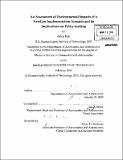| dc.contributor.advisor | Ian A. Waitz. | en_US |
| dc.contributor.author | Fan, Alice | en_US |
| dc.contributor.other | Massachusetts Institute of Technology. Dept. of Aeronautics and Astronautics. | en_US |
| dc.date.accessioned | 2010-08-31T16:20:23Z | |
| dc.date.available | 2010-08-31T16:20:23Z | |
| dc.date.copyright | 2010 | en_US |
| dc.date.issued | 2010 | en_US |
| dc.identifier.uri | http://hdl.handle.net/1721.1/57881 | |
| dc.description | Thesis (S.M.)--Massachusetts Institute of Technology, Dept. of Aeronautics and Astronautics, 2010. | en_US |
| dc.description | Cataloged from PDF version of thesis. | en_US |
| dc.description | Includes bibliographical references (p. 109-115). | en_US |
| dc.description.abstract | With demand for aviation projected to grow by 5% per year over the next 20 to 25 years, policy makers must not only consider ways to ensure that the air transportation system can accomodate significant growth, but also how their policy decisions will affect the environment. Because environmental issues are becoming increasingly apparent, the sustainability of policy measures will likely constrain responses to this potential increase in aviation demand. Policy makers will need to consider various trade-offs that come with policy decisions, and find ways to balance the demands of the air transport system with the need to reduce the environmental impact of aviation. This thesis assesses the environmental impacts of implementing a policy scenario, which employs both operational and technological improvments to the air transport system. The impacts are presented in both physical and monetary metrics using the Aviation environmental Portfolio Management Tool, to allow for a comparison of trade-offs among different environmental effects. This thesis discusses the limitations of this particular scenario, while also providing an overview of policy-making models, and the observed weaknesses in current policy-making processed involving technical data. In particular, it identifies the mismatch between needs of those involved in the policy-making process, and the information provided by analysts, which can be an obstacle to developing credible and objective support for a policy proposal. It finally provides suggested methods for improving the relationship between different groups involved in developing policy to allow for better informed decision-making, and a more fluid policy-making process. | en_US |
| dc.description.statementofresponsibility | by Alice Fan. | en_US |
| dc.format.extent | 115 p. | en_US |
| dc.language.iso | eng | en_US |
| dc.publisher | Massachusetts Institute of Technology | en_US |
| dc.rights | M.I.T. theses are protected by
copyright. They may be viewed from this source for any purpose, but
reproduction or distribution in any format is prohibited without written
permission. See provided URL for inquiries about permission. | en_US |
| dc.rights.uri | http://dspace.mit.edu/handle/1721.1/7582 | en_US |
| dc.subject | Aeronautics and Astronautics. | en_US |
| dc.title | An assessment of environmental impacts of a nextGen implementation scenario and its implications on policy-making | en_US |
| dc.type | Thesis | en_US |
| dc.description.degree | S.M. | en_US |
| dc.contributor.department | Massachusetts Institute of Technology. Department of Aeronautics and Astronautics | |
| dc.identifier.oclc | 639233830 | en_US |
